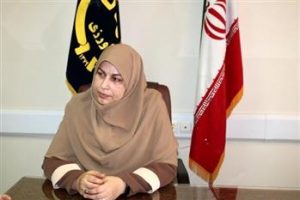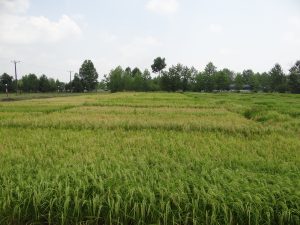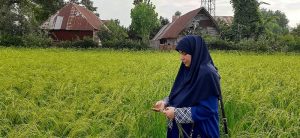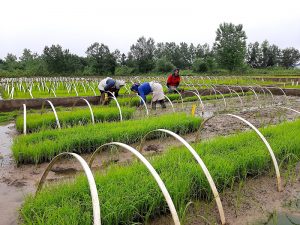 Dr. Hossieni Director-General of Rice Research Institute of Iran (RRII): The production of certified rice seeds meets only 18% of paddy farmers’ needs.
Dr. Hossieni Director-General of Rice Research Institute of Iran (RRII): The production of certified rice seeds meets only 18% of paddy farmers’ needs.
Guilan Province Branch of Tasnim News Agency – Dr. Hossieni Director-General of Rice Research Institute: The production of certified rice seeds meets only 18% of paddy farmers’ needs and the Ministry of Jahad Agriculture plan to reach 50%.
In an interview with Tasnim reporter in Rasht, Guilan, Iran, Dr. Maryam Hossieni stated that seeds are the most important input in rice cultivation, therefore we strongly advised paddy farmers’ to use certified seeds. According to the RRII field survey, most rice farmers now use self-seed production.
Director-General of Rice Research Institute of Iran added: Since ancient times, farmers have been involved in producing seeds by themselves, but the methodologies they apply are traditional, old, and experience-based. The seeds produced by farmers have less quality that cannot be compared with the seeds of research institutes and private companies. Thus, either farmers need updated information about seed production techniques or increase the certified seeds production by licensed centers.
Dr. Hossieni pointed out: Certified seeds are standard and approved seeds that are kept under controlled supervision, production, threshing, packaging conditions, and storage in ventilated warehouses, whereas, the self-produced seeds have not standard characteristics due to physical mixing between the seeds of different cultivars, reduces the purity of white rice and consequently the low purity of white rice decreases its final price.
 She also added: “On the other hand, in addition to impurities, self-produced seeds have weed seeds and unfilled and immature seeds, and because they are not threshed and stored in inappropriate conditions, they are often contaminated with various fungi and have many problems in the rice nursery.”
She also added: “On the other hand, in addition to impurities, self-produced seeds have weed seeds and unfilled and immature seeds, and because they are not threshed and stored in inappropriate conditions, they are often contaminated with various fungi and have many problems in the rice nursery.”
Dr. Hossieni, Director-General of Rice Research Institute of Iran stated that in these unstable and un-standard conditions, not only the amount of seed consumption will increase, but also during mechanized harvesting the seeds of different fields to be mixed. Therefore, it is strongly recommended that all farmers should use certified seeds that are produced under the supervision of the rice research institute of Iran. These registered and certified Seeds and Seedlings must have an approval label for more accuracy. The most important characteristics of these seeds are purity of above 98%, vigor index of about 80%, and humidity about 13%. Also, certified seeds are free of weed seeds and pathogens.”
 She also said: “The certified seeds passed the several tests such as monitoring in the fields at different rice growth stages, purity, vigor index, and other standard requirements are checked in the laboratory, and if approved, the seeds will receive the approval label and will be provided to farmers as certified seeds.”
She also said: “The certified seeds passed the several tests such as monitoring in the fields at different rice growth stages, purity, vigor index, and other standard requirements are checked in the laboratory, and if approved, the seeds will receive the approval label and will be provided to farmers as certified seeds.”
Dr. Hossieni said: “Of course, although cross-pollination also reduces the purity of seeds by less than 5%, so maintaining the purity of produced seeds, a process called the production of different seed classes in rice is followed; Seed fields of different cultivars are isolated and spaced apart.
She said that the seed classes in rice are called super-elite, elite, foundation, registered, and certified, respectively, and each class is a prerequisite for the production of the next class, and going from basic classes such as super-elite to the final class, certified seeds, the rice production rate considerably increases. The seeds of the basic classes such as super-elite and elite are produced by the rice research institute and given to the private sector for the next actions.
Dr. Hossieni, the Director-General of Rice Research Institute of Iran said: “Registered and certified seeds classes are produced by agricultural support services companies, the crop production cooperative unions, and the private sector, and the production, threshing, and packaging stages monitored by the Seed and Seedling Registration and Certification Research Institute.”
She also added: In the rice-growing year of 1400, the certified seeds of local and improved rice cultivars in Guilan and Mazandaran provinces were given to paddy farmers as a result of the efforts of a team consisting of the crop deputy of the local agricultural jihad organizations, research institutes, companies under the supervision of the Jahad-Agriculture Ministry, the private sector and farmers.
 Dr. Hossieni, the Director-General of Rice Research Institute of Iran, referring to the development of a mid-term plan to increase rice production across the country, stated: this mid-term plan to increase rice production across the country controlled by the Deputy Minister of Agriculture of the Ministry of Jahad Agriculture through a 10-year seed production program.
Dr. Hossieni, the Director-General of Rice Research Institute of Iran, referring to the development of a mid-term plan to increase rice production across the country, stated: this mid-term plan to increase rice production across the country controlled by the Deputy Minister of Agriculture of the Ministry of Jahad Agriculture through a 10-year seed production program.
She said that the local Jahad-agricultural jihad organizations of Guilan and Mazandaran provinces are responsible for implementing the rice seed production programs, and leading the provincial seed committee, and the seed production contractors are selected based on practical training, theory, and experience. “Training courses are held for seed producers every year,” he said. Be up to date with the latest seed production guidelines.
Dr. Hossieni added: “Currently, the production of certified rice seeds in the country meets about 18% of the needs of paddy farmers, and according to the approved mid-term program of the Jahad – Agriculture, it must reach to 50%.” During the last three years, for developing the registered and certified production across the country, the rice research institute of Iran has increased the production of foundation seeds to 4.
Dr. Hossieni said: “easy and fast access of farmers to certified seeds and encouraging them to use these safe and standard seeds not only decrease the seed consumption, increases yield, increases the purity of white rice and increases farmers’ incomes, but also it plays a vital role to increase the quality of domestic rice. Also, with these arranged plans, at least half of the paddy farmers will have access to certified seeds in the next few years, and this is a step towards maintaining food security in the rice field,” She said.

